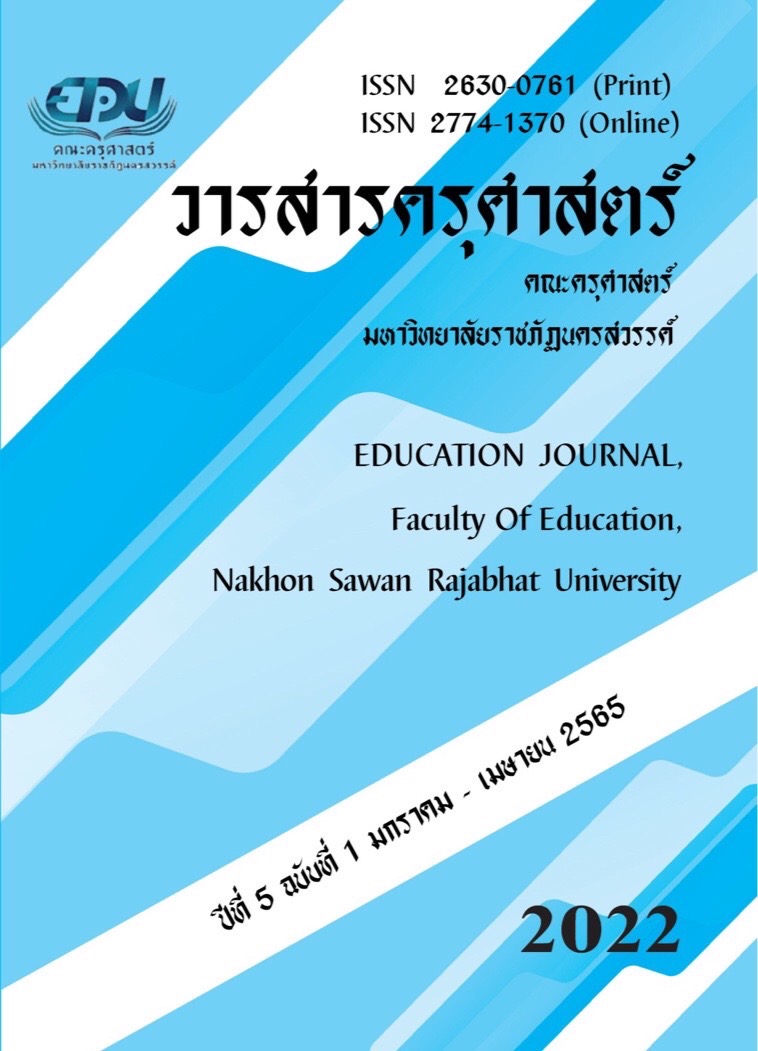Learning Management Skills Vocational Skills Using the Learning the Learning Management Process by the Teachers of Wat Amat Wittaya School
Main Article Content
Abstract
Abstract
The objectives of this research were as follows: 1) to develop skills in project-based learning management that emphasized the teachers' vocational skills; 2) To study the problem of project-based learning management that emphasizes on teacher's professional skills. Phra Pariyat Thamma School, Wat Amat Wittaya Resources used in the study There are 22 administrators and teachers of Wat Amat Wittaya School, 179 novices, a total of 201 people. divided into 2 important phases. Phase 1, development of project-based learning management skills. The tools used were 1) a learning management plan for teaching projects focused on vocational skills, 2) a teacher's project-based learning process skills questionnaire, 3) an assessment form for the novice students' vocational skills project process skills, and 4) an assessment form. Satisfaction of novice students of Phrapariyattidhamma School towards project learning management focusing on vocational skills. Analyze the data by means. Standard Deviation, t-test, Phase 2, a study of project-based learning management problems focusing on vocational skills the informant is There were 22 administrators and teachers. The tools used were 1) a structured interview form. 2) a record of teachers' reflection on participation in the project. Data were analyzed by frequency distribution. and content analysis The results showed that. 1. The results of the development of project-based learning management skills focused on vocational skills of 1.1) The quality of the teacher's project-based learning management plan focused on vocational skills. 1.2) Project-based learning management skills emphasizing teachers' professional skills The evaluation results after joining the project were higher than before joining the project. statistically significant at the .05 level. 1.3) Novice students' project process skills are at the highest level. 1.4) Novice students' satisfaction with learning management of focused projects.The overall vocational skill was at the highest level. 2. The results of a study on the problems of project-based learning management that focus on vocational skills 2.1 ) Results from the interview The first three important problems are as follows: 1) Teachers have a very special workload. causing no time to prepare for teaching 2) unable to arrange time to consult novice students as needed 3) novice students have workloads to perform Sangha activities, thus unable to perform other projects. 2.2) Results from the teacher's reflection, it was found that the teachers had learned to write a learning management plan and a project-based teaching. Teachers learned 21st century teaching skills. Teachers exchanged knowledge with fellow teachers from other schools.
Downloads
Article Details

This work is licensed under a Creative Commons Attribution-NonCommercial-NoDerivatives 4.0 International License.
References
กองทุนเพื่อความเสมอภาคทางการศึกษา.(2563). ฝึกอาชีพนักเรียนสามเณร ต่อยอดเรียนรู้สายอาชีพขชั้นสูง. สืบค้นเมื่อ 10 กุมภาพันธ์ 2564, จาก https://www.eef.or.th/interview-01-09-20/.
ดุษฎี โยเหลา, และคณะ. (2557). การศึกษาการจัดการเรียนรู้แบบ PBL ที่ได้จากโครงการสร้างชุด ความรู้เพื่อสร้างเสริมทักษะแห่งศตวรรษที่ 21 ของเด็กและเยาวชน: จากประสบการณ์ ความสำเร็จของโรงเรียนไทย. กรุงเทพฯ: ห้างหุ้นส่วนจำกัดทิพย์วิสุทธิ์.
ทิศนา แขมมณี. (2551). ศาสตร์การสอน: องค์ความรู้เพื่อการจัดกระบวนการเรียนรู้ที่มีประสิทธิภาพ. กรุงเทพฯ: สํานักพิมพ์จุฬาลงกรณ์มหาวิทยาลัย.
ธีระชัย ปูรณโชติ. (2551). กรณีศึกษาการทำโครงงานวิทยาศาสตร์. (พิมพ์ครั้งที่ 2). กรุงเทพฯ: จุฬาลงกรณ์มหาวิทยาลัย.
พระราชบัญญัติการศึกษาแห่งชาติ. (2553). ราชกิจจานุเบกษา. เล่ม 127 (ตอนที่ 45 ก): 1 – 3.
ลัดดา ภู่เกียรติ. (2561). การจัดการเรียนรู้ การทำโครงงาน. สืบค้นเมื่อ 10 กุมภาพันธ์ 2564, จาก http://sukho.nfe.go.th/Insukho/dourses/4/section2_1.html.
ศรัณยู หมื่นเดช. (2559).การพัฒนารูปแบบการเรียนการสอนแบบโครงงานร่วมกับสื่อสังคม เพื่อส่งเสริมความคิดสร้างสรรค์ สำหรับนักเรียนระดับมัธยมศึกษาตอนต้น. วารสารศึกษาศาสตร์ มหาวิทยาลัยนเรศวร. 22(2): 182 - 192.
สำนักงานคณะกรรมการการศึกษาแห่งชาติ. (2553). พระราชบัญญัติการศึกษาแห่งชาติ พ.ศ. 2542 และที่แก้ไขเพิ่มเติม (ฉบับที่3) พ.ศ.2553. กรุงเทพฯ: สำนักนายกรัฐมนตรี.
สำนักงานเลขาธิการสภาการศึกษาและกระทรวงศึกษาธิการ. (2550). แนวทางจัดการเรียนรู้ที่เน้นผู้เรียนเป็นสำคัญการจัดการเรียนรู้แบบโครงงาน. กรุงเทพฯ: ชุมนุมสหกรณ์การเกษตรแห่งประเทศไทย.
อภิชาติ เลนะนันท์. (2559). การพัฒนาการสอนแบบโครงงาน สำหรับครูประถมศึกษา จังหวัดเพชรบุรี. วารสารวิชาการฉบับ ภาษาไทย สาขามนุษยศาสตร์ สังคมศาสตร์ และศิลปะ. 9(2): 957 - 967.
Dewey, J. (1897). My Pedagogic Creed. In D. Efstratia, Percedia-Social and Behavioral Sciences. 152(2014): 1256 - 1260.
Khuharuangrong, K. (2010). A comparison of problem solving ability and attitude of Mattayomsuksa one students toward occupation and technology subjectusing project-based method and 4 MAT(Master thesis). Phranakhon Sri Ayutthaya:Phranakhon Si Ayuthaya Rajabhat University.
Maslow, A. (1970). Human needs theory: Maslow’s hierarchy of human needs. In R.F. Craven & C. J. Hirnle (Eds.), Fundamental of Nursing: Human Health and Function. (3rd ed.). Philadelphia: Lippincott.


